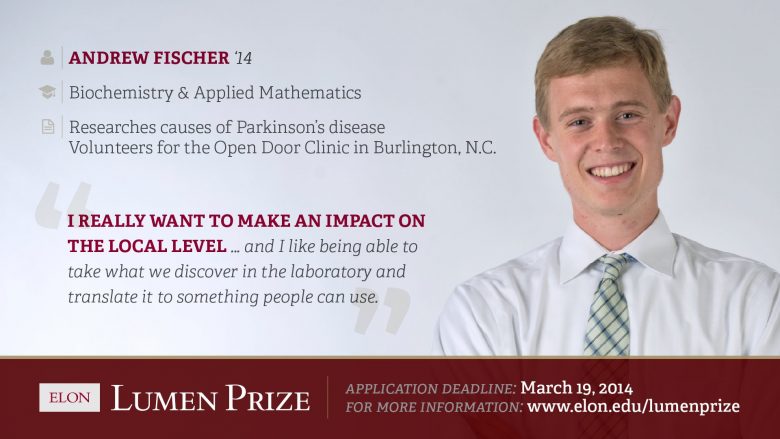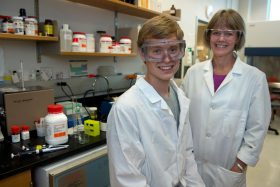Inspired in part by his grandmother’s fight against Parkinson’s disease, Elon University senior Andrew Fischer hopes his undergraduate research will be a small contribution to the elusive search for a cure to the degenerative neurological condition.
 The National Parkinson Foundation estimates that as many as 60,000 new cases of Parkinson’s disease are diagnosed in the United States each year with more than a million Americans combatting the same disorder that afflicts actor Michael J. Fox, boxer Muhammad Ali and the evangelist Billy Graham.
The National Parkinson Foundation estimates that as many as 60,000 new cases of Parkinson’s disease are diagnosed in the United States each year with more than a million Americans combatting the same disorder that afflicts actor Michael J. Fox, boxer Muhammad Ali and the evangelist Billy Graham.
Is a cure imminent? No. Does a top Elon University undergraduate scholar hope his own work will provide a small scientific contribution to finding that cure? He sure does.
As senior biochemistry and applied mathematics double major Andrew Fischer will tell you, there’s no better way to give back to society than by using your passions and talents – in this case, undergraduate research – and his work is the first to be featured this academic year in a series of profiles on Lumen Scholars in the Class of 2014.
Under the mentorship of Associate Professor Kathy Matera, Fischer has spent much of the past two years in a McMichael Science Center laboratory recreating the chemical reactions that take place in the brain to determine why certain proteins clump together and then break apart in Parkinson’s patients, damaging the cells responsible for movement and coordination.
Researchers believed for a long time that it was the clumps themselves triggering the symptoms associated with the disease, including tremors and body rigidity. Theories now suggest it’s the breakdown of the larger protein clumps, called Lewy bodies, into smaller soluble aggregates that result in cell death. Scientists know that some derivatives of dopamine, a neurotransmitter within the brain, play a role in that breakdown and Fischer is studying one such oxidized derivative.
His ultimate goal is to develop a theory about how the aggregations and breakdowns occur. “My experiences as a Lumen Scholar have given me confidence in the laboratory and have developed my problem-solving abilities in the face of unexpected setbacks,” he said.

The Lumen Prize, awarded for the first time in 2008, provides selected students with a $15,000 scholarship to support and celebrate their academic and creative achievements. Lumen scholars work closely with faculty mentors to pursue and complete their projects.
Efforts include course work, study abroad, research both on campus and abroad as well as during the regular academic year and summer, internships locally and abroad, program development and creative productions and performances.
The Lumen Prize made it possible for Fischer to purchase proteins that otherwise would be difficult to finance. It also allowed him to give an oral presentation at a regional conference in Raleigh in 2012 and will be helpful in presenting research at national conferences between now and May.
Matera praised Fischer’s growth as both a student and a researcher. His initially reserved personality in the lab changed to that of a scientist eager and willing to discuss research with others, Matera said. Today he is more vocal and a top leader in the lab, the “go to” person who has earned the admiration of both classmates and faculty in the McMichael Science Center.
“He’s a guy who is incredibly brilliant, one of the best students I’ve ever had,” said Matera, whose own research has looked into chemical properties found in the brains of Alzheimer’s patients.
Fischer is a College Fellow and took part in the Summer Undergraduate Research Experience during the summer of 2012. He serves as president of the chemistry honor society Phi Lambda Upsilon, is a member of the mathematics honor society Pi Mu Epsilon, and participates in the Omicron Delta Kappa, Phi Kappa Phi and Phi Eta Sigma academic honor societies
In 2012, the Department of Chemistry awarded him its Eugene Gooch Memorial Organic Achievement Award for high achievement in organic chemistry.
It turns out that Fischer is also a brilliant dancer. When not immersed in the laboratory or classroom, he captains the university’s ballroom dance team. A passion for ballroom dancing emerged during his freshman year.
“I came into Elon with absolutely no dance experience, and if you had told me in high school that I would become a ballroom dancer, I would have laughed,” he said. “But it’s been a great experience and has helped me discover who I am outside of the sciences.”
Fischer is applying to medical schools this year with the goal of taking his Lumen Prize experience into his clinical practice. Research has the potential to inform the way doctors treat patients, he explained, and the possibilities are endless.
“I really want to make an impact on the local level, connecting with a population and possibly my own community,” he said. “And I like being able to take what we discover in the laboratory and translate it to something people can use.”


